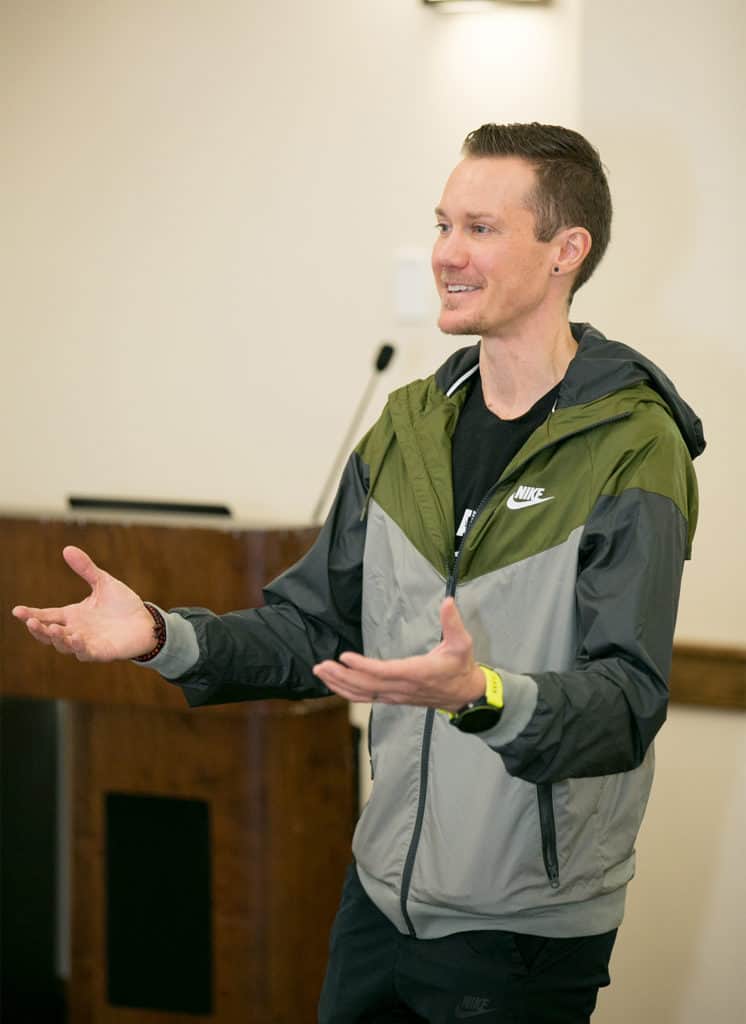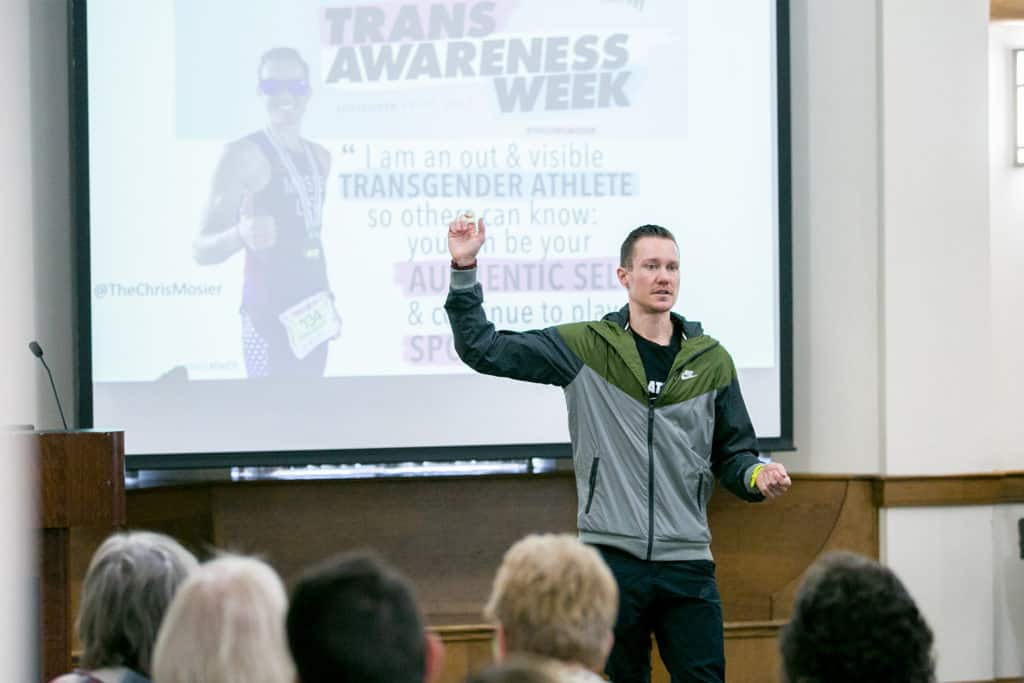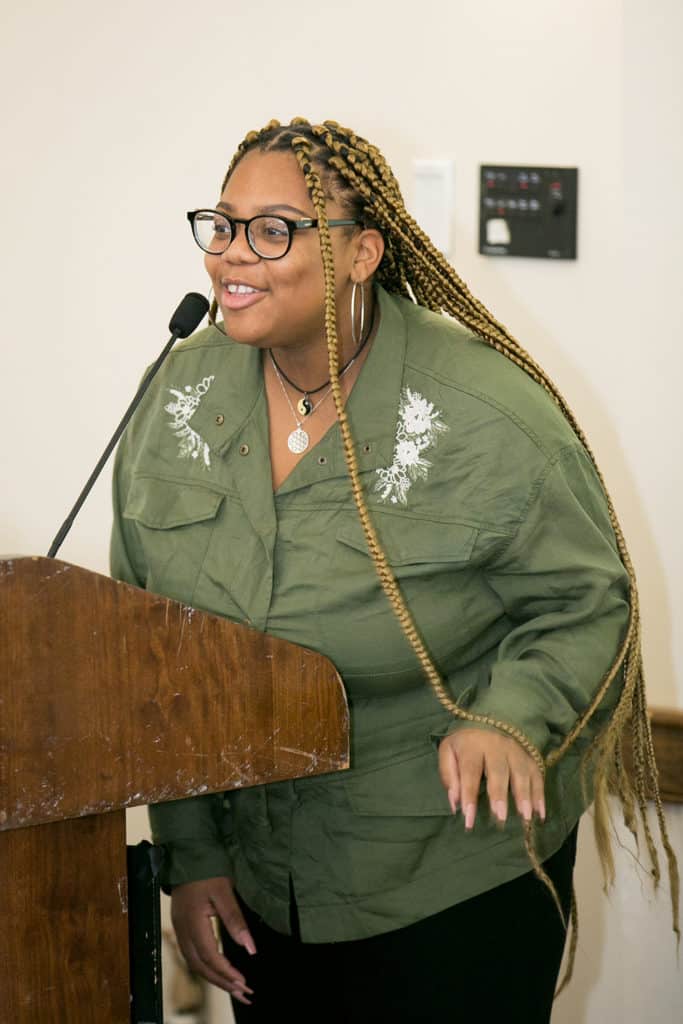Transgender Athlete Speaks at Trinity College for Transgender Awareness Week
Trinity College celebrated National Transgender Awareness Week with a talk by Chris Mosier, the first transgender athlete to make a men’s U.S. National Team (in triathlon), the first transgender athlete in ESPN The Magazine’s Body Issue, and the first transgender athlete sponsored by Nike. Mosier spoke to an audience of Trinity students, staff, and faculty on Tuesday, November 19, in Mather Hall’s Terrace Rooms.

Mosier emphasized the importance of colleges creating an inclusive environment to ensure that LGBTQ+ students, staff, and faculty feel welcomed and said that the queer community needs allies. “An ally has to take action. It is incredibly draining and exhausting to stand up for oneself,” said Mosier. He shared advice with the audience about how Trinity could be more supportive of LGBTQ+ students, including by installing all-inclusive bathrooms, having self-awareness with the use of language and pronouns, creating a webpage dedicated to transgender resources, and encouraging an openness with sharing queer experiences. Mosier said, “I noticed a trans flag on one of the buildings on my walk here; it signaled to me the campus is a welcoming space.”
Mosier stressed the value of queer individuals being able to see themselves represented. “I did not know a single queer person growing up, but it would have been different if I knew that transgender people played sports,” said Mosier. Today, Mosier’s motto is, “Be the person you needed when you were younger.”

Director of Athletics and Chair of Physical Education Drew Galbraith said that inviting Mosier to campus during Transgender Awareness Week was a great way to raise the visibility of transgender athletes. “The talk also addressed the myriad of issues the transgender community faces not only on college campuses, but at every level of sport – from youth and high school all the way to elite international competitors. For our coaches and student-athletes, hearing Chris’s message is powerful and hopefully it broadens perspectives on creating inclusive environments in sport,” said Galbraith.
In 2013, Mosier created the website transathlete.com, a resource for students, athletes, coaches, and administrators to find information about trans inclusion in athletics at various levels of play. When he came out, Mosier learned that many people did not know what transgender meant and found that few sports organizations had policies regarding transgender athletes.

Mosier also cited a case at Bloomfield High School, where transgender athletes have faced opposition in Connecticut from people who think transgender girls should not be allowed to compete against cisgender girls, or girls who identify with their sex assigned at birth.
“I am not a threat, nor are any other transgender athletes, to the sport,” added Mosier. “It is not just about athletics; it is life or death.” He reminded the audience that a reported 22 transgender individuals lost their lives this year because of their identity. The Trinity College Chapel and Queer Resource Center, in collaboration with Encouraging Respect of Sexualities (EROS), observed the Trans Day of Remembrance at the Chapel on November 21.
EROS President Lucemy Perez ’21, who introduced Mosier, said, “At a college where queer life hardly intersects meaningfully and visibly with other aspects of campus life, having Chris Mosier interact directly with athletics and then with the campus at large was critical. Having transgender folks and other gender nonconforming or queer people at the forefront of our campus conversations is necessary, particularly in the midst of Trans Awareness Week.”
Carrie Robinson, Trinity’s director of LGBTQ+ Life, added, “Bringing a speaker like Chris to campus allows for the conversation about trans inclusion to begin on our campus.” Robinson believed that the audience was able to take away some important information and steps that can be discussed both in small and large groups.
Mosier concluded his talk with, “It is possible to be your authentic self and do you what you love. You do not have to give up who you are because of your passion.”
